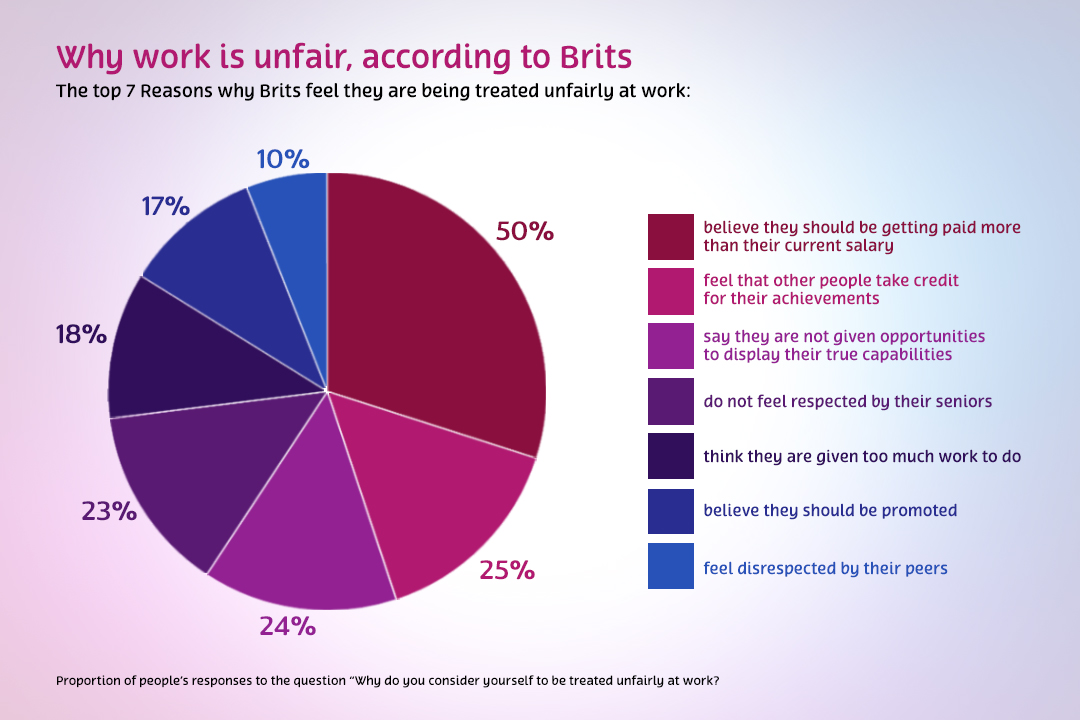- Only 10% of all Brits think that their work environment is completely fair
- A mere 2% of our nation believe that success is based purely on ability
- Nearly a third of 35-44 year olds feel disrespected by their seniors at work
It seems that only a very small number of Brits think they’re being treated completely fairly at work, according to a recent survey investigating whether fairness and success go hand in hand. But what makes a workplace fair? And indeed, as much as we might want to believe it, does fairness have a direct link to success?
The findings came as a rather surprising wake-up call. From a tiny 10% of Brits who think they’re getting the full fair treatment at work, London featured the most satisfied workers with 15% whilst in Wales only 5% of workers said they were fully satisfied. So where is this feeling of unfair treatment coming from?
Paying for performance, for example is seen by some managers as a fruitless act. In a recent study, it was found that setting stretching goals drives better performance than the size of the monetary reward offered in exchange. Meaning that big bonuses could potentially make performance worse!
The fact that 50% percent of Brits believe they’re being underpaid makes us question this. Just how valued would you feel if your workload continued to increase but your salary remained the same or indeed not receiving that promised pay increase yet again? Is there a success-method weaved into their salary allowances or are these people simply being underpaid for their job roles? The answer is surely not black and white.
A tiny 2% of all Brits think that success is based purely on ability. You’ve got the skills, you’ve got the know-how, but achievement sometimes just doesn’t follow. This might be down to some key “fair” factors that research suggests greatly contribute to success at work. Having an autonomy-supportive manager has been shown to contribute to a solid sense of well-being at work, allowing for self-gratifying success. Proportion is another key factor contributing to work success by achieving the optimal balance between boredom and stress. Being “in the zone” is ultimately determined by whether the task falls short of or exceeds one’s capabilities.

The survey also revealed almost a third of 35-44 year olds in the UK feel disrespected by their seniors at work. Psychological research has shown us that high-quality relationships are critical in promoting engagement, motivation and resilience. An estimated three-quarters of employees say their boss is the most stressful part of their job. Further studies have shown that having a bad boss can actually make you sick. We’ve all heard or experienced first-hand episodes of those office ‘favourites’ getting promoted before other more deserving colleagues. Having a fair manager that treats all their employees with equal respect would unquestionably pave the way for success.
There are of course those people who feel a major resentment towards their superiors – their senior roles undoubtedly reward them a higher pay-package with a perhaps more flexible/less work-heavy schedule. However fair it does or doesn’t seem, research shows that this kind of resentment can actually put your career at risk. You’d be making far better use of your time by focusing on where your own career is going – even your boss had to start at the bottom after all.
Let’s not forget about “office politics”. We’ve all had to deal with it at some point or other. It doesn’t always seem fair and at times it certainly won’t be, but to survive and thrive at work, you’ve got to learn how to play the game. Many of us have witnessed first-hand those top performers who have mastered the art of winning in office politics.
So there we have it. It seems that fairness can a substantial part of our work-life success. This together with hard work and a can-do attitude, no doubt. Fairness at work does take effort on some parts, but the upside of its subsequent successes has limitless potential.
A spokesman for PlayOJO said:
“We are challenging the UK online casino industry by being honest and transparent and we are interested in raising awareness of unfairness in other aspects of British society such as the link between fairness and personal success in the workplace.”
“Whilst our research shows a large percentage of Brits that think there is unfairness in the workplace, it is clear from our findings that the public feel that success isn’t always fair and is rarely based on ability alone.”


















